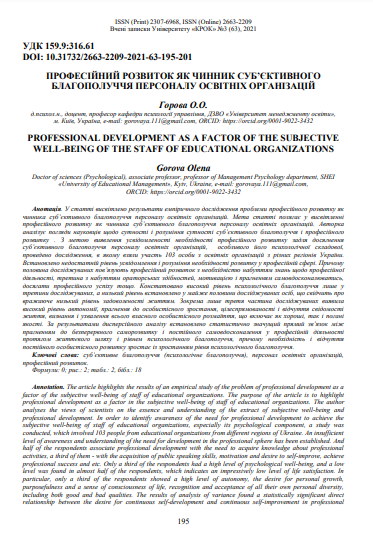PROFESSIONAL DEVELOPMENT AS A FACTOR OF THE SUBJECTIVE WELL-BEING OF THE STAFF OF EDUCATIONAL ORGANIZATIONS
DOI:
https://doi.org/10.31732/2663-2209-2021-63-195-201Keywords:
subjective well-being (psychological well-being), staff of educational organizations, professional developmentAbstract
The article highlights the results of an empirical study of the problem of professional development as a factor of the subjective well-being of staff of educational organizations. The purpose of the article is to highlight professional development as a factor in the subjective well-being of staff of educational organizations. The author analyses the views of scientists on the essence and understanding of the extract of subjective well-being and professional development. In order to identify awareness of the need for professional development to achieve the subjective well-being of staff of educational organizations, especially its psychological component, a study was conducted, which involved 103 people from educational organizations from different regions of Ukraine. An insufficient level of awareness and understanding of the need for development in the professional sphere has been established. And half of the respondents associate professional development with the need to acquire knowledge about professional activities, a third of them - with the acquisition of public speaking skills, motivation and desire to self-improve, achieve professional success and etc. Only a third of the respondents had a high level of psychological well-being, and a low level was found in almost half of the respondents, which indicates an impressively low level of life satisfaction. In particular, only a third of the respondents showed a high level of autonomy, the desire for personal growth, purposefulness and a sense of consciousness of life, recognition and acceptance of all their own personal diversity, including both good and bad qualities. The results of analysis of variance found a statistically significant direct relationship between the desire for continuous self-development and continuous self-improvement in professional activities throughout life and the level of psychological well-being, and the need and sense of continuous personal development increase with increased psychological well-being.
Downloads
References
Аргайл М. Психология счастья. / А. Лисицына (пер. с англ.). Санкт-Петербург : Питер, 2003. 271 c.
Балахтар К. С. Особливості впливу креативності на суб’єктивне благополуччя викладачів іноземних мов закладів вищої освіти: дис. на здобуття наук. ступ. доктор філософії 053 Психологія. ДЗВО «Університет менеджменту освіти». Київ, 2021. 323 с.
Бондарчук О. І. Кар'єрні орієнтації керівників освітніх організацій як чинник їхнього суб’єктивного благополуччя. Вісник післядипломної освіти: збірник наукових праць. 2016. Вип. 2(31). С.18-28.
Данильченко Т. В. Особливості вивчення соціальних потреб як предиктора суб’єктивного благополуччя особистості. Вісник Чернігівського національного педагогічного університету, 2015. №126, С. 63-69.
Зелінська С. Ф. Співвідношення показників суб’єктивного благополуччя особистості з типами її само відношення. Вісник ОНУ ім. І. Мечнікова, 2012. №17, 8 (20). С.83-90.
Кологривова Е. І. Вплив особистісних прагнень на переживання суб'єктивного благополуччя. Соціальна психологія. 2006. №5, С. 179-184.
Корнеева Л. Н. Психологический аспект влияния профессиональной деятельности на личности. Москва : Просвещение, 1991. 218 с.
Семиченко В. А. Психологічні аспекти професійної підготовки і післядипломної освіти педагогічних кадрів. Післядипломна освіта в Україні, 2001. №1. С. 54-57.
Федосеева Н. А. Анализ ключевых категорий образа жизни. Успехи современного естествознания, 2010. №5, С. 93-95.
Хоржевська І. М. Професіоналізм та професійний розвиток особистості. Наука і освіта. 2016. №11. с. 55-60.
Швалб Ю. Психологічні критерії визначення стилю життя. Соціальна психологія. 2003. №2, С. 14-20.
Barker P. H. Managing student behavior: How ready are teachers to meet the challenge? American Secondary Education, 2005. 33(3), р. 51-64.
Diener E. The Satisfaction With Life Scale. Journal of Personality Assessment, 1985. 49 (1), р. 71-75
Diener E. The science of well-being: The collected works of Ed Diener. New York: Springer, 2009.
Diener, E. & Oishi, S. Money and Happiness: Income and Subjective Well-Being across Nations. Culture and Subjective Well-Being, 2000. 185-218. E. Diener, E.M. Suh (Eds.). Cambridge, MA: MIT Press
Ryan R. M. & Deci E. L. On happiness and human potentials : A review of research on hedonic and eudaimonic well-being. Annual Review of Psychology, 2001. 52(1), pp. 141-166.
Seligman M. E. P., Rashid, T., & Parks, A. C. Positive psychotherapy. American Psychologist, 2006. 61, 774-788.
Scheerens, J. Teachers’ professional development. Europe in international comparison. An analysis of teachers’ professional development based on the OECD’s Teaching and Learning International Survey (TALIS). Luxembourgh : Office for Official Publications of the European Union, 2010. 204 p.



